This article dives into effective ways to prevent elopement in children with autism, focusing on personalized strategies and community involvement. It highlights various approaches like:
These strategies are all designed to tackle the specific triggers of wandering behaviors, ultimately enhancing the safety and well-being of our children.
As parents, we know how challenging it can be to keep our little ones safe. By understanding these interventions, we can feel more empowered to take action. Let’s explore this together! Each of these approaches offers a unique way to support our kids and create a safer environment for them.
Think of Functional Behavior Assessments as a way to get to the heart of what might lead to wandering. They help us identify triggers and develop tailored strategies. Similarly, using GPS tracking devices can provide peace of mind, allowing us to keep an eye on our children without feeling overwhelmed.
Environmental modifications can also make a big difference. Simple changes in our home or routine can help minimize risks. And let’s not forget about structured routines—these can offer our children a sense of security and predictability in their day-to-day lives.
Together, these strategies can transform our approach to keeping our kids safe. We’re here to help you every step of the way! Feel free to share your thoughts or experiences in the comments; let’s foster a supportive community where we can learn from each other.
The safety of children with autism is a pressing concern for many families, especially when it comes to the risk of elopement. Did you know that nearly half of children on the spectrum experience wandering behaviors? This highlights the urgent need for effective interventions. In this article, we’ll explore nine evidence-based strategies designed to prevent elopement. We aim to offer parents and caregivers valuable insights into personalized approaches that can enhance safety and well-being.
But what challenges do families face when implementing these interventions? And how can they leverage community resources and technology to create a supportive environment for their children? Let’s dive in together and find some answers!
At Rori Care, we understand the challenges parents face regarding their children's safety, particularly in relation to interventions for elopement in children with autism. That's why we employ a data-driven approach to Applied Behavior Analysis (ABA) therapy. Our qualified analysts conduct detailed assessments, including functional analysis, to identify the specific triggers that lead to wandering. This helps us create personalized behavior intervention plans tailored just for your child, including interventions for elopement, complete with measurable goals and evidence-based strategies.
We know how important it is for families to be involved in their child's care journey. That's why our plans come with automatic progress reports for clinician review, so you can stay informed every step of the way. By fostering cooperation between families and healthcare providers, Rori Care takes a proactive stance in preventing runaway incidents through effective interventions for elopement, ultimately enhancing safety and well-being for your child.
Ongoing data collection and collaboration among caregivers and therapists are essential to ensure our strategies remain effective as your child's needs evolve. We also recommend practical environmental modifications, such as:
as crucial components of effective interventions for elopement prevention strategies.
Through our compassionate ABA treatment, we’re here to guide your family on the journey toward positive behavior changes and skill acquisition. Let’s explore this together! Your child's well-being is our top priority, and we’re committed to supporting you every step of the way.

GPS tracking devices are essential tools for parents of kids with autism who face wandering risks. These handy devices let caregivers keep an eye on their child's location in real-time, sending quick alerts if their little one strays beyond a safe zone. By using GPS technology, families can jump into action during emergencies, helping to reduce the dangers linked to wandering.
Many of these devices come with cool features like geofencing and SOS buttons, adding extra layers of safety. Research shows that electronic tracking devices can cut down wandering frequency by nearly 23%, and 96% of parents report feeling an improvement in their quality of life after using them. Real-life stories reveal that families using these devices have successfully avoided runaway incidents, boosting overall safety.
Incorporating GPS technology not only brings peace of mind to parents but also fosters a caring environment that prioritizes the well-being of children at risk of running away, demonstrating the need for interventions for elopement. Plus, empowering caregivers with knowledge about ABA principles and strategies enhances their ability to support their child's behavioral goals. This leads to informed decision-making and better behavioral outcomes. And let’s not forget, positive reinforcement strategies can further improve the effectiveness of interventions for elopement, creating a well-rounded approach to safety.
Let’s explore this together and see how these tools can make a difference in your family’s life!
![]()
Functional Behavior Assessments (FBAs) are so important for understanding what triggers wandering behaviors in young people with developmental disorders. By taking a closer look at the situations where running away happens, our clinicians at Rori Care can identify specific triggers—like sensory overload, escaping demands, or even seeking attention. Did you know that 49% of young individuals with autism spectrum disorders (ASD) have tried to run away at least once after age 4? This highlights just how common this behavior can be!
Understanding these triggers helps us develop targeted interventions for elopement that address the root causes of wandering, rather than just reacting to the behavior itself. At Rori Care, our dedicated clinicians create personalized intervention strategies tailored to each young person's unique needs. We emphasize caregiver education and involvement, ensuring that families feel supported throughout this journey.
Our compassionate approach has led to successful case studies showing that these tailored interventions for elopement significantly reduce incidents. It’s truly amazing to see how effective this proactive method can be! Plus, our behavior care engine generates automated progress reports, which means we can continuously monitor and assess each student's progress.
Under the Individuals with Disabilities Education Act (IDEA), conducting an FBA is a legal requirement when a child with a disability faces significant disciplinary changes. This underscores the importance of these assessments in educational settings. The emotional impact of a child running away can be profound, often leading to increased stress and anxiety for families.
To help parents, keeping a record of running away incidents can be a game-changer in identifying common triggers. By focusing on the unique triggers for each individual, FBAs pave the way for effective strategies that foster a supportive environment and enhance overall well-being. We’re here to help you every step of the way, equipping caregivers with the knowledge and resources they need to support their loved ones' behavioral goals. Let’s explore this together!
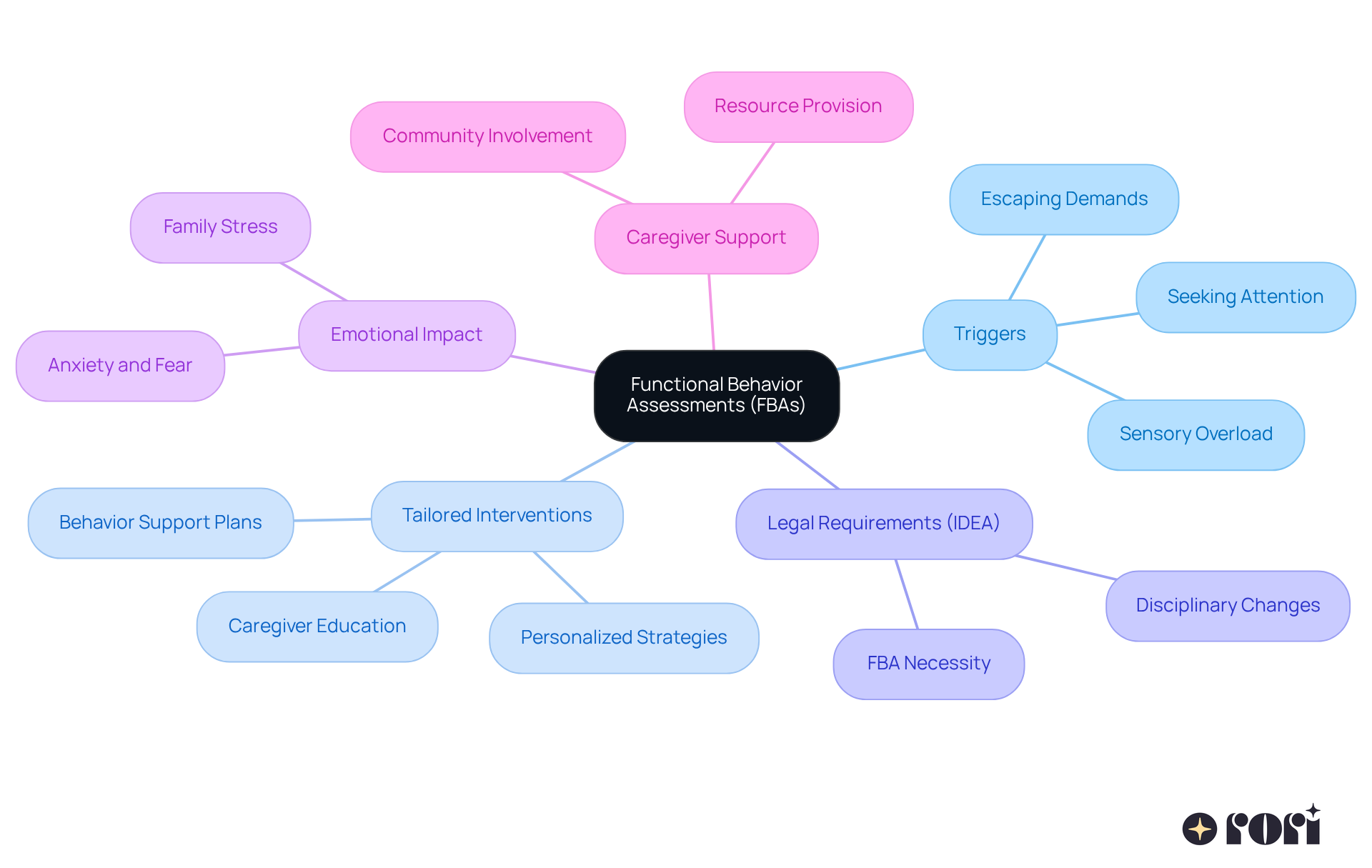
Environmental modifications play a vital role in implementing interventions for elopement behaviors in individuals with autism. By creating safe spaces that reduce sensory overload and distractions, caregivers can cultivate a sense of security, ultimately lowering the chances of wandering. For example:
These modifications can make a big difference.
Caregivers who understand ABA principles are better equipped to make these modifications, ensuring they align with their loved one's behavioral goals. Adding calming elements, like soft lighting and sensory-friendly materials, can enhance comfort and help reduce the urge to elope. Therapists often share that these thoughtfully designed environments not only address immediate safety concerns but also promote emotional well-being, making young people feel more at ease in their surroundings.
This proactive approach is essential for families looking to lower runaway risks through interventions for elopement while fostering a nurturing atmosphere. Plus, incorporating tracking devices, such as GPS technology, adds an extra layer of security for youth at risk of wandering off. Active involvement from caregivers, backed by their education, can lead to better behavioral outcomes and empower them to create a supportive environment that maximizes the impact of their interventions.
Let’s explore this together! By sharing experiences and seeking resources, we can all contribute to a safer, more comforting space for our loved ones.

Involving parents in runaway prevention tactics is essential for creating a strong support network for kids with autism. Engaged parental participation in therapy sessions helps caregivers understand their child's specific triggers and actions. By implementing tailored strategies at home, parents can create a consistent environment that reinforces therapeutic goals.
Consistent interaction with therapists and clinicians is vital. This ensures that parents are well-prepared with the knowledge and resources needed to effectively handle interventions for elopement. This collaborative approach not only promotes a sense of empowerment and confidence in parents but also significantly enhances the overall development and safety of the young one.
Let’s explore this together! By sharing experiences and insights, we can create a nurturing environment for our children. Remember, you’re not alone in this journey—there's a community ready to support you every step of the way!
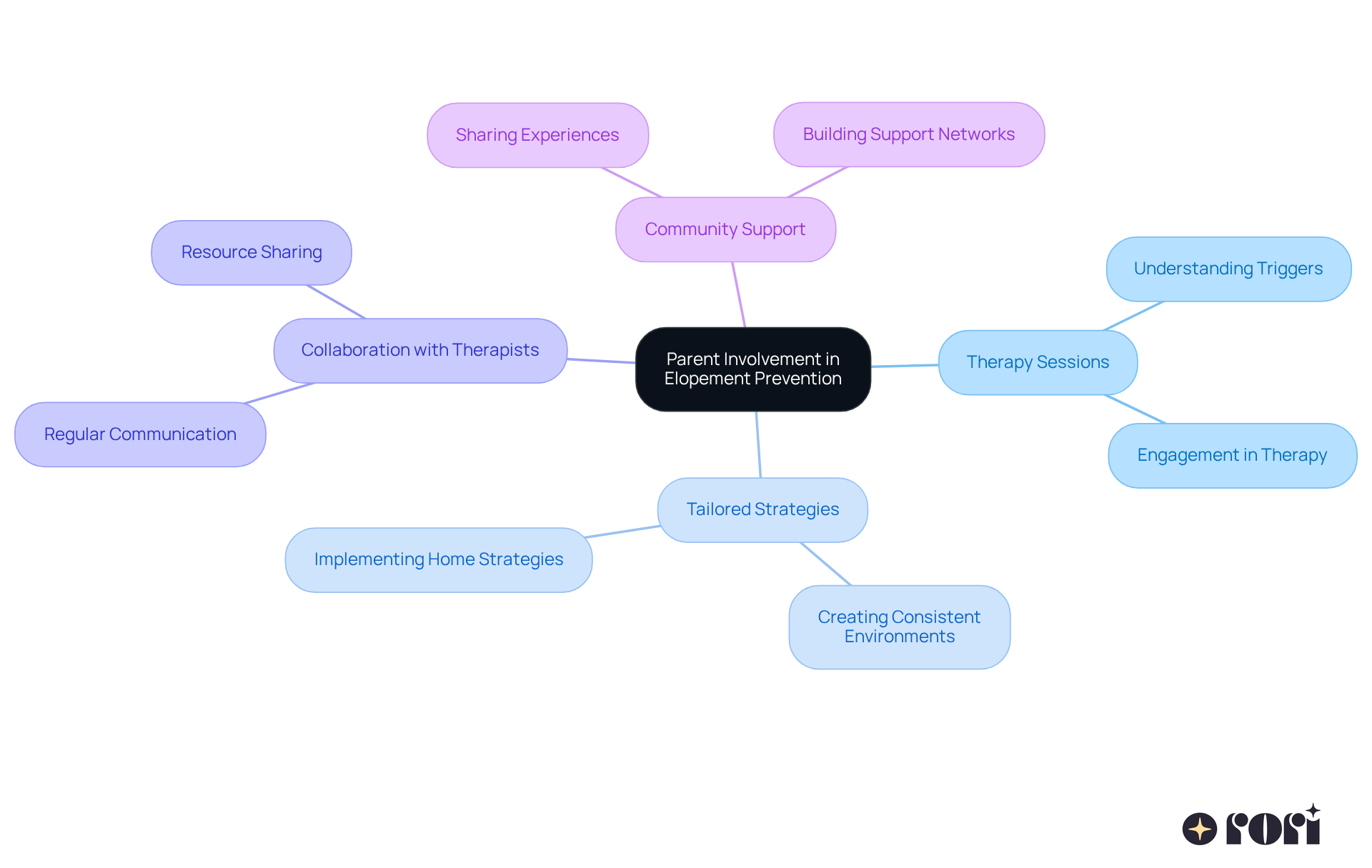
Positive reinforcement methods are so important when it comes to reducing wandering actions among kids with autism. By rewarding desired actions—like staying close to caregivers or following safety instructions—children are more likely to repeat these positive behaviors. Think of reinforcements as little gifts of encouragement! They can come in many forms, such as verbal praise, small rewards, or even extra privileges. This approach not only helps kids stick to the rules but also strengthens the bond between them and their caregivers, facilitating the implementation of interventions for elopement and making it easier to manage wandering risks.
Research shows that families using around 11 evidence-based interventions for elopement report a significant drop in occurrences of wandering. Isn’t that amazing? It really highlights how effective structured reward systems can be! Experts in behavior emphasize that prompt and consistent reinforcement leads to better outcomes. It encourages kids to self-regulate and manage their actions more effectively. By weaving positive reinforcement into daily routines, caregivers can create a nurturing environment that boosts safety and fosters independence. Let’s explore this together and see how we can support our little ones every step of the way!
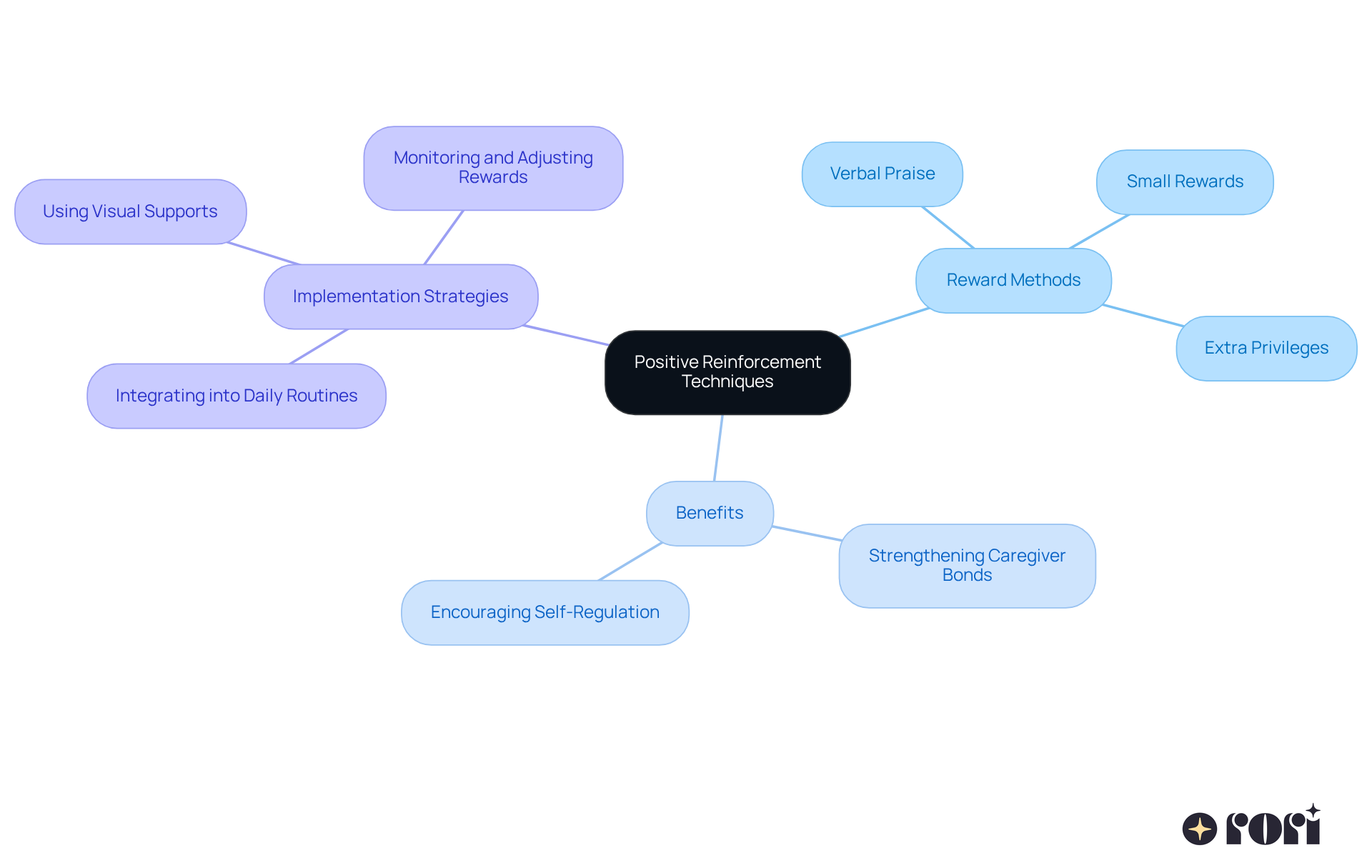
Community awareness initiatives are so important for helping everyone understand the risks that come with running away, especially for young people with developmental disorders. By organizing workshops, informational gatherings, and outreach programs, we can really boost awareness about these disorders and their unique traits. This increased understanding creates supportive environments where neighbors and local organizations can step up to help families in crisis.
Did you know that nearly 50% of young people with developmental disorders tend to wander off? Many of them can go missing for periods that raise serious safety concerns. Community programs can provide vital resources and support networks for families facing the challenges of a runaway situation, including interventions for elopement, which help to ease the stress and anxiety that often accompany these incidents.
When communities are educated and involved, they have the power to significantly enhance the safety and well-being of young individuals with developmental disorders. Together, we can foster a more inclusive and caring environment for everyone. Let’s explore this journey together, and remember, we’re here to help you every step of the way!

Technology-driven solutions like mobile apps and wearable gadgets play a crucial role in helping youth with developmental disorders who may wander. Safety-focused applications come with features such as real-time location tracking, emergency notifications, and communication tools for caregivers. This allows families to keep an eye on their child's movements effectively. Research shows that mobile applications significantly enhance safety for children with autism, providing instant alerts during wandering incidents. For instance, apps like 'Track It' enable parents to log behaviors and identify triggers, fostering a proactive approach to managing those moments when a child might leave.
Understanding that kids often wander to escape situations, access items or activities, engage in fun experiences, or seek attention is key to tailoring effective interventions. Plus, integrating functional communication training (FCT) can boost these tech solutions by teaching children alternative ways to express their needs, which can help reduce the likelihood of running away. By utilizing these technologies, caregivers can create a safer environment, ensuring quick responses to potential departure situations.
Moreover, educating caregivers enhances their ability to support their children at home, leading to better behavioral outcomes and stronger family dynamics. The insights gained from such programs empower caregivers, alleviating stress and fostering consistency in their approaches. Embracing mobile technology not only enhances safety but also nurtures independence and confidence in youth with autism, making it an invaluable resource for families. Let’s explore this together and see how these tools can make a difference!
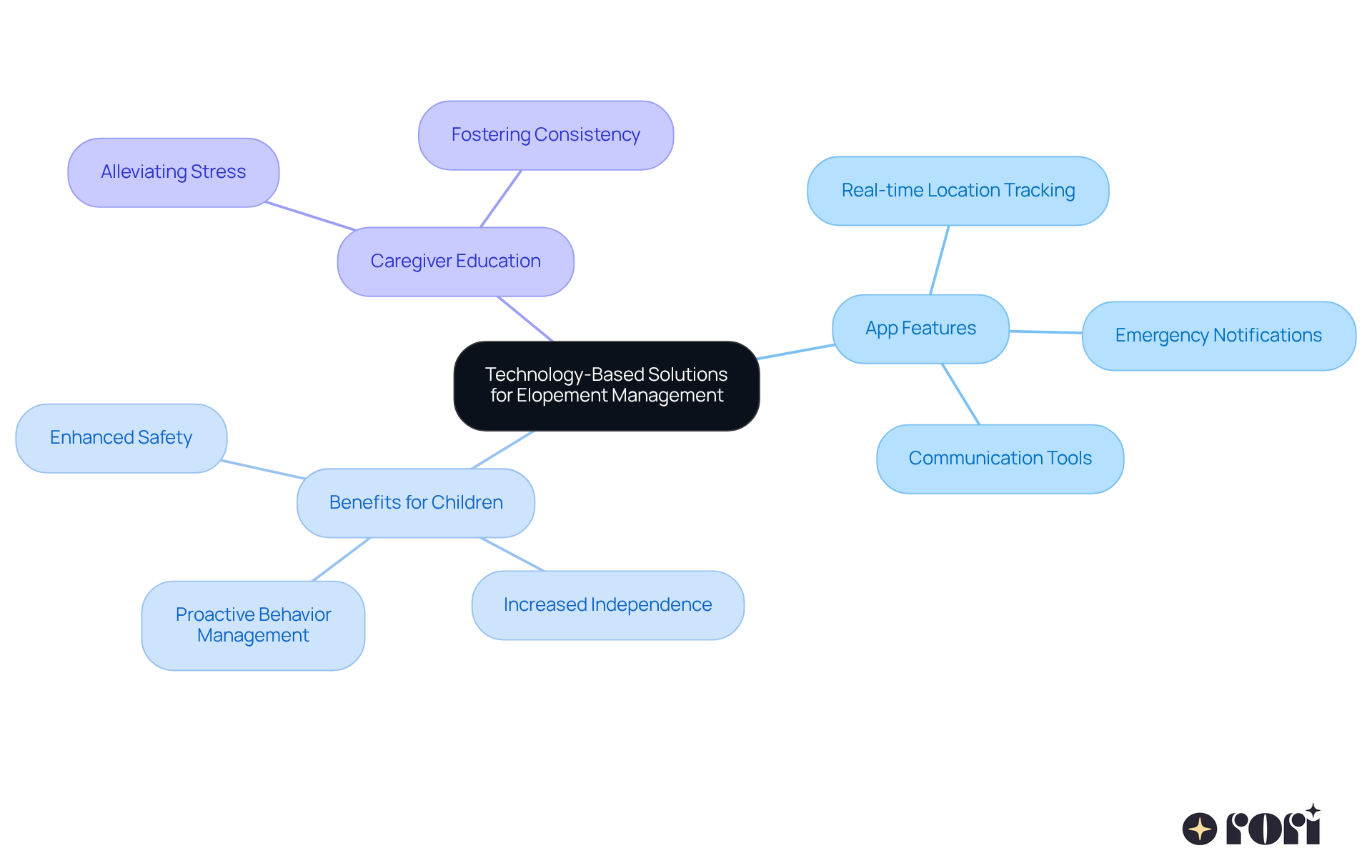
Cooperating with law enforcement is so important for ensuring a quick response during escape incidents. Families can take proactive steps by connecting with local police departments and sharing vital information about their unique needs and behaviors. By creating a tailored safety strategy that outlines the young person's interventions for elopement, we can significantly enhance law enforcement's ability to respond effectively in emergencies.
For example, the Harris County Precinct One Constable’s Office has rolled out an 8-hour TCOLE-certified autism training program for officers. This initiative has been a game-changer, improving interactions with families in crisis. At Rori Care, we’re here to guide your family’s journey! We offer comprehensive and compassionate Applied Behavior Analysis treatment, empowering caregivers with the knowledge and strategies they need to support their loved ones' behavioral goals.
Did you know that research shows 53% of youngsters who attempted to run away went missing for a time that raised alarms? Even more concerning, 50% of guardians reported receiving no assistance on how to handle such situations. This highlights the urgent need for resources and support systems. Effective collaboration between families and law enforcement agencies has demonstrated that well-informed officers can implement interventions for elopement, which can make a significant difference in emergency scenarios and ultimately safeguard the welfare and well-being of individuals on the autism spectrum. Let’s explore this together!

Establishing organized routines can be a game-changer for reducing wandering behaviors in kids with autism. When daily routines are predictable, children have a clearer idea of what to expect, which can really help ease anxiety and the urge to roam. 🌟 Research shows that visual schedules can effectively lower anxiety levels and reduce incidents of elopement through targeted interventions for elopement. In fact, studies indicate that between 63% and 88% of participants reported improvements when these strategies were put into place.
By using visual aids and ensuring smooth transitions, caregivers can really boost their child’s sense of security. Consistency in daily routines not only fosters stability but also reduces the chances of wandering. This creates a supportive environment where children can truly thrive. Let’s explore this together and see how we can make a positive impact!
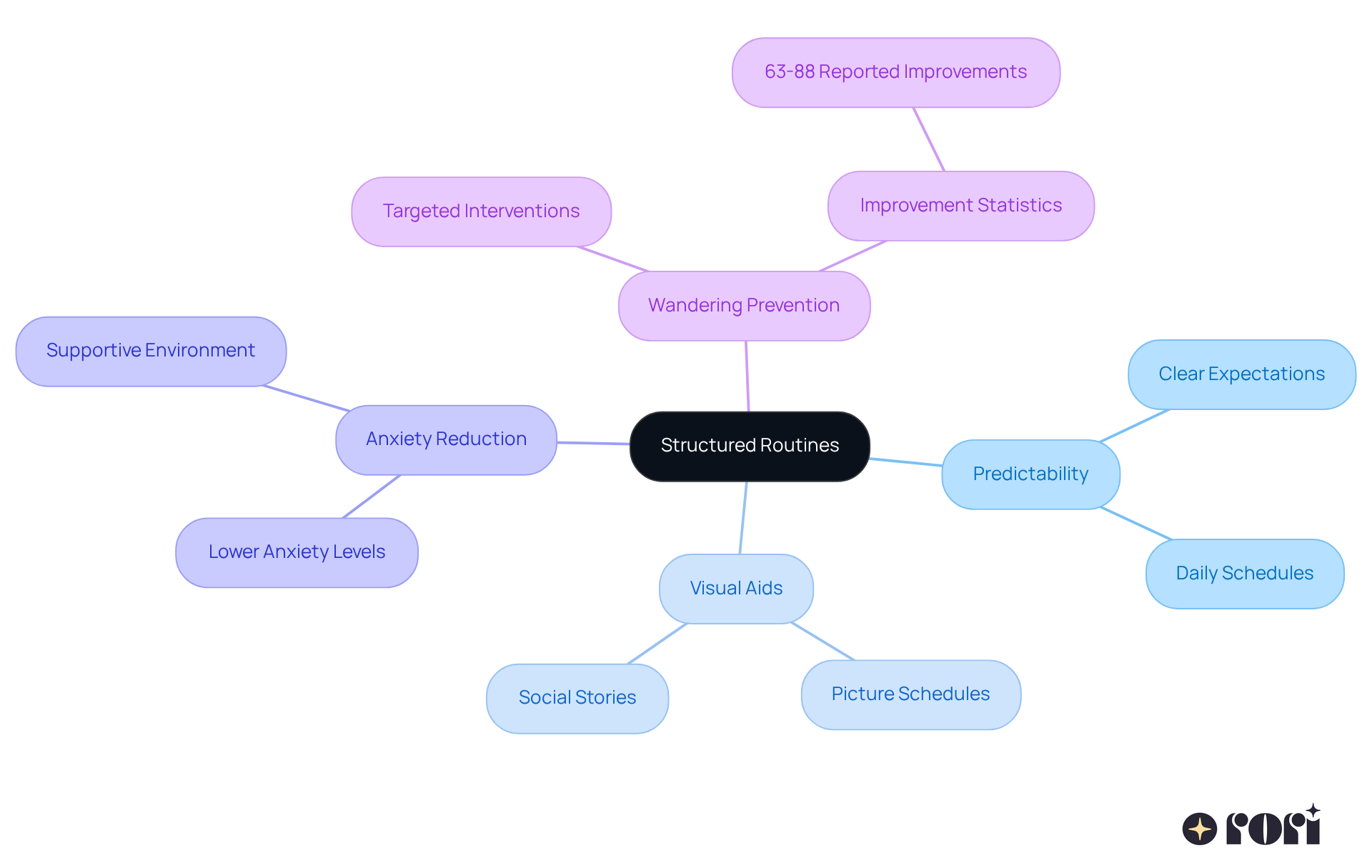
Understanding and addressing elopement in children with autism is a journey that requires a multifaceted approach. It’s all about combining personalized interventions, technology, and community support. In this article, we’ve explored nine effective strategies that not only enhance safety but also empower families to create a nurturing environment for their children. By focusing on tailored interventions—like functional behavior assessments, GPS tracking devices, and positive reinforcement techniques—caregivers can significantly reduce the risks associated with wandering behaviors.
We’ve highlighted key insights, such as:
Each of these strategies contributes to a holistic approach that prioritizes the well-being of children with autism.
Ultimately, the significance of these interventions is immense. By fostering awareness and collaboration among families, professionals, and communities, we can cultivate a safer and more supportive environment for children at risk of elopement. Engaging in these strategies not only protects children but also promotes their independence and confidence. It’s crucial for families to explore these options and seek resources that can help them navigate this journey effectively. Let’s explore this together! Together, we can make a meaningful difference in the lives of children with autism and their families.
What is Rori Care's approach to preventing elopement in children with autism?
Rori Care employs a data-driven approach to Applied Behavior Analysis (ABA) therapy, conducting detailed assessments to identify triggers that lead to wandering. This allows them to create personalized behavior intervention plans tailored to each child's needs.
How does Rori Care involve families in their child's care?
Rori Care provides automatic progress reports for clinician review, fostering cooperation between families and healthcare providers to keep families informed and involved in their child's care journey.
What are some recommended strategies for preventing elopement?
Recommended strategies include securing doors with locks, installing alarms or GPS devices, and ongoing data collection and collaboration among caregivers and therapists to adapt interventions as the child's needs evolve.
What role do GPS tracking devices play in ensuring the safety of children with autism?
GPS tracking devices allow caregivers to monitor their child's location in real-time and send alerts if the child strays beyond a safe zone, significantly reducing the risks associated with wandering.
What are some features of GPS tracking devices that enhance safety?
Many GPS tracking devices include features like geofencing and SOS buttons, which provide additional layers of safety for children at risk of wandering.
How effective are GPS tracking devices in reducing wandering incidents?
Research shows that electronic tracking devices can reduce wandering frequency by nearly 23%, and 96% of parents report an improvement in their quality of life after using them.
What are Functional Behavior Assessments (FBAs) and why are they important?
FBAs are assessments that identify specific triggers for wandering behaviors in individuals with developmental disorders. They are crucial for developing targeted interventions that address the root causes of elopement.
What common triggers for elopement do FBAs help identify?
Common triggers include sensory overload, escaping demands, and seeking attention. Understanding these triggers is essential for creating effective intervention strategies.
How does Rori Care support families during the intervention process?
Rori Care emphasizes caregiver education and involvement, providing knowledge and resources to support families in managing their child's behavioral goals throughout the intervention process.
What legal requirement is associated with conducting an FBA?
Under the Individuals with Disabilities Education Act (IDEA), conducting an FBA is a legal requirement when a child with a disability faces significant disciplinary changes.